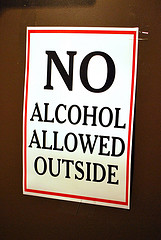 In many movies, totalitarian governments closely track banned behavior: in Demolition Man, for instance, people are automatically fined for public swearing.
In many movies, totalitarian governments closely track banned behavior: in Demolition Man, for instance, people are automatically fined for public swearing.
We are already going a bit further in real life. The Post reports that law enforcement in the US has begun to use tracking anklets which monitor the wearer’s sweat and detect any forbidden alcohol intake.
This application might be a good idea — it is a way to crack down on recidivist drunk drivers — but it also goes much farther than any totalitarian government has been able to in the past. A wide variety of biochemical states could be monitored.
In The Sixth Day, smoking and red meat were banned, and this technology could be used to enforce that kind of rule. It is not as implausible as it might sound: employers might want to check in on a variety of chemicals in their workers’ systems, and insurance companies might even want to verify that people really were entitled to that discount for not smoking or drinking too much.
(Image courtesy meddygarnet, Flickr)
